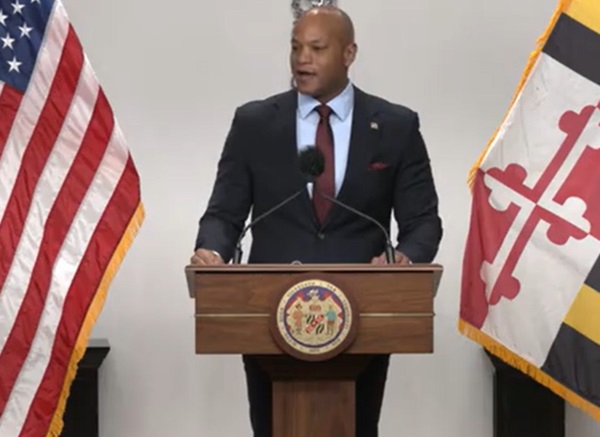Do you value local journalism? Support NottinghamMD.com today.
ANNAPOLIS, MD—Governor Wes Moore this week unveiled the ENOUGH Act, a first-in-the-nation state-level effort to end concentrated poverty. Joined at LIFE Ministries Church in Brooklyn by Lieutenant Governor Aruna Miller; Senate President Bill Ferguson; Speaker of the House Adrienne A. Jones; Baltimore Mayor Brandon M. Scott; Baltimore City Councilwoman Phylicia Porter; Baltimore Community Foundation Chief Executive Officer Dr. Shanaysha Sauls; and Life Ministries Church Pastor Amin Flowers, Governor Moore laid out the details of the legislation, which will provide support and resources in communities to address the root causes of poverty.
“ENOUGH will be the rallying cry not just here in Baltimore, but ENOUGH will be the rallying cry all throughout the state of Maryland. We’ve had enough with poverty, crime, and a system where generational challenges go unaddressed. We’ve had enough of the same neighborhoods facing the same issues – and coming up with the same solutions that drive the same results,” said Governor Moore. “We will help transform distressed communities into places with top schools; good jobs, safe neighborhoods, quality housing, and economic momentum. That’s the future we’re trying to build. And we’re going to build it in partnership.”
“Ending the cycle of generational poverty that burdens children and families has been at the heart of our administration’s mission since day one,” said Lt. Gov. Miller. “Today represents the next phase in this important work. Through the ENOUGH Act, we will direct resources to the communities that need it most with targeted investments that will support the holistic development of safer, stronger, more economically prosperous communities.”
The ENOUGH Act uses place-based interventions in communities with disproportionately high numbers of children living in poverty—rural, suburban and urban. Communities that show an ability to assess existing pathways to success, coordinate across sectors, and address challenges strategically and in a holistic manner can apply for competitive grant funding of up to $10 million per year. The program will be run through the Governor’s Office of Children.
“As the senator for the 46th District, and as a former educator, I have seen firsthand how poverty can impede the potential of our children,” said Senate President Bill Ferguson. “The ENOUGH Act will bring resources and support to the city to help our highest-need neighbors by concentrating and coordinating multiple partners’ resources on clearly identified neighborhoods.”
“We have a social responsibility as a state to protect and lift up the most vulnerable in our communities,” said Maryland House Speaker Adrienne A. Jones. “The ENOUGH Act supports this effort and will reinforce the values of decency and compassion we need to create thriving communities across the State.”
“Since taking office, my focus as Mayor of Baltimore has been to help our city overcome the decades of intentional disinvestment in our communities – particularly our young people. The ENOUGH Act is a sweeping assurance from Governor Moore and his administration that they share that commitment,” said Baltimore City Mayor Brandon Scott. “We have made incredible progress in bolstering the neighborhoods that were once so often left behind, but when the ENOUGH Act passes, the state’s level of support for this work will simply be a gamechanger for Baltimoreans everywhere.”
“I am grateful and energized to implement this important legislation for community organizations, non-profits, anchor institutions, and other key community members to come together and develop a locally-focused plan of action for addressing poverty. Through The ENOUGH Act, South Baltimore’s District 10 will correct decades of disinvestment and craft an ending to concentrated poverty,” said Baltimore City Councilwoman Phylicia Porter. “For too long, champions of South Baltimore’s District 10 have not had the necessary support and resources to identify the root causes of poverty and start addressing them. This initiative and collaboration with the Moore-Miller Administration will break the cycle of multi-generational poverty and create better opportunities for education, employment, and housing for so many legacy communities in District 10.”
ENOUGH will address gaps in existing funding streams to support children and families—from early child care and education to affordable housing, public safety, and support for civic infrastructure. ENOUGH partnerships must include at least one community-based non-profit; one local government entity; and one local public school. Partnerships may also include unions or worker organizations; anchor institutions like local health care organizations; institutions of higher education; small businesses; local law enforcement; or faith-based organizations.
“The Baltimore Community Foundation’s vision is that Baltimore boasts a growing economy where all have the opportunity to thrive. The ENOUGH Act builds the social capital, political will, ideas, credibility, capacity and scale, to take us closer to this vision,” said Baltimore Community Foundation President and Chief Executive Officer Dr. Shanaysha Sauls. “We are delighted and honored to support its intent and realization.”
“Houses of worship have always brought grassroots leaders together to solve big problems in the community,” said LIFE Ministries Church Pastor Amin Flowers. “We were proud to host the Governor and so many community leaders today, and are eager to build a bright future together.”
The ENOUGH Act is part of the Moore-Miller Administration’s recently announced 2024 legislative package, which includes 16 bills that advance the governor’s priorities to make Maryland safer, make Maryland more affordable, make Maryland more competitive, and make Maryland the state that serves. The ENOUGH Act is a major step toward strengthening Maryland’s economy and a core plank in the administration’s commitment to building a state that leaves no one behind.
“By effectively harnessing the power of our communities, government can empower residents to meet their full potential and strengthen the quality of life in our neighborhoods,” said Baltimore County Executive Johnny Olszewski. “We are so excited about the potential of the ENOUGH Act to help develop, support, and build upon place-based initiatives, like what we’ve embarked upon in communities like Essex, to disrupt cycles of poverty and create renewed opportunities for our neighbors and for residents across our state.”
“Poverty and its impacts have been the greatest obstacles to opportunity and economic growth in our state and our country,” said Anne Arundle County Executive Steuart Pittman. “The ENOUGH Act demonstrates that the Moore-Miller Administration is serious about working with local governments and communities to address it.”
“Through our efforts to advance health equity, we’ve witnessed the critical need for initiatives like the ENOUGH Act. Its focus on reducing child poverty and enhancing community health and well-being is an essential step forward that we are proud to support,” said CareFirst BlueCross BlueShield President and Chief Executive Officer Brian D. Pieninck. “The ENOUGH Act lays the groundwork to create healthier, more equitable communities for our youth, which directly aligns with CareFirst’s mission to address social determinants of health. We applaud the governor for this initiative and are fully committed to lending our support to see its success.”
“We’re proud to stand in support of the ENOUGH Act and the Moore-Miller Administration’s continued focus on eradicating childhood poverty through a variety of initiatives, including continued support of the Blueprint for Maryland’s Future and equitably ensuring that every child in Maryland has the opportunity to pursue their dreams,” said Maryland State Education Association President Cheryl Bost.
“To break the cycle of intergenerational poverty, you must recognize the impact a child’s environment has on their success. A child living in an under-resourced and underinvested community will face barriers to their future success before they are even out of the womb. Governor Moore’s ENOUGH Act takes a whole-of-government approach to acknowledge child poverty as an intersectional issue, reshaping how Maryland tackles child poverty,” said Geoffrey Canada, Founder and President of Harlem Children’s Zone (HCZ) and Founder of William Julius Wilson Institute at HCZ. “By addressing the root causes of child poverty and adopting a multifaceted approach to everything from education to healthcare, Maryland can create a future where no child’s potential is limited by their zip code.”
More in the video below…
This morning, I’m in Baltimore’s Brooklyn neighborhood with local officials and community leaders to announce the next step in our administration’s action to eliminate poverty in our communities.
Join us for the announcement of The ENOUGH Act: https://t.co/tl8E7kwaMV
— Governor Wes Moore (@GovWesMoore) January 29, 2024


